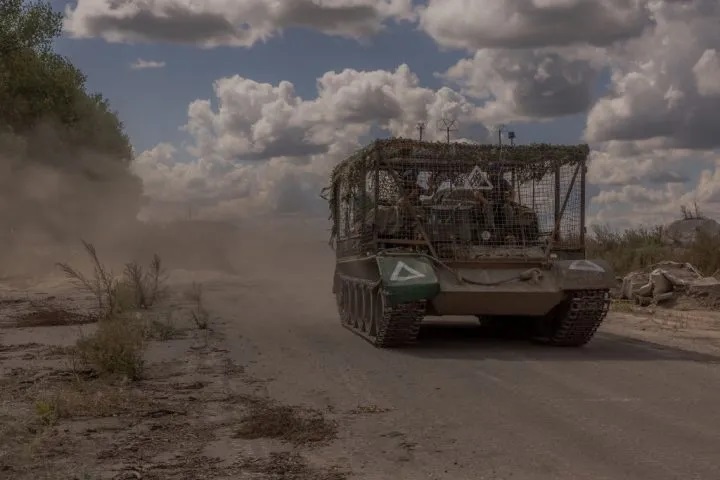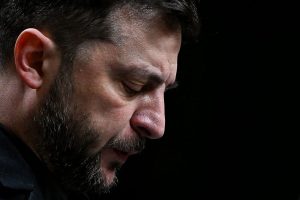The road from the Ukrainian city of Sumy to the Russian border gave just a foretaste of the fighting twenty miles ahead. We passed tanks on transporters, armored vehicles, and occasionally an olive-green ambulance with flashing lights speeding the Ukrainian wounded away from the battlefield.
In dusty half-deserted villages, stray dogs roamed and a few locals still moved around on Soviet-era bicycles. But mostly we saw 4x4s emblazoned with the white triangle that is the mark of troops taking part in Ukraine’s attack on the Russian region of Kursk.
There was almost unanimous support for the first attack on mainland Russia since World War Two
It is a little over a week since Kyiv’s units — among them some of the most battle-hardened in this war-torn country — smashed through the Russian border just south of the small town of Sudzha and fanned out, eventually seizing several hundred square miles of land. It was a gambit that was so unexpected that some of Moscow’s soldiers were killed while they were sipping coffee in the open air.
Though unlikely to presage a decisive military shift, the attack on Russia proper has dramatically changed the narrative in the Russo-Ukrainian conflict and, by all accounts, seriously embarrassed Vladimir Putin.
In the last few days news has come from both sides of the frontline that the Ukrainian advance is beginning to slow. Volodymyr Syrsky, head of the Ukrainian military, said his soldiers were only adding one or two miles a day to their advance as Russian resistance increased. He added that Ukrainian troops had captured an additional 100 Russian prisoners of war, to add to the hundreds taken during the initial stages of the fighting.
Whatever the military algebra, for Ukrainians I spoke to who have lived in the shadow of Moscow’s guns since February 2022 there was almost unanimous support for the first attack on mainland Russia since World War Two.
Sveta, who runs a café and shop in Pysarivka about half way between Sumy and the border, said: “They have been bombing us without thought for two and a half years. They are even bombing us today. Am I happy that we are now fighting on Russian soil? I am delighted.”
Outside Sveta’s café, five Ukrainian soldiers who were part of the initial attack were smoking cigarettes and chatting. They said they had been given a few days off to rest. My colleague and I had been turned back at the Ukrainian army checkpoint just north of the village — the Ukrainians are keeping tight control on access to the combat zone — and took the opportunity to gauge the mood among Kyiv’s troops.
I asked Lesha, a fit twenty-eight-year-old with bulging muscles from the Zhytomyr region of western Ukraine, what he felt when he first crossed into Russia. “I’m finding it difficult to find the words,” he said. “It’s almost indescribable, difficult to believe. We were were digging trenches and laughing as we were doing it.”
Afonya, thirty-five, like Lesha, has been fighting almost non-stop since the beginning of the war. As we chatted, he reached into his pocket and, with a grin, pulled out a Russian fifty ruble note. He wrote the words “Victory to Ukraine” on it and handed it to me. Then the Ukrainian soldiers began to show us Russian patches and flashes and other trophies of war.
A few hundred yards away there was less jubilation. In the early hours of the morning a Russian bomber had dropped a KAB — a glide bomb — badly damaging four houses. Judging by the twisted metal and broken axle still on the verge, the bomb had also hit a Ukrainian military vehicle. There would almost certainly have been casualties.
Just twenty yards from where the bomb fell, Haluna, sixty-six, her daughter, Svetlana, thirty-eight, and her granddaughter Taya, eighteen, had been sleeping in the front rooms of their home. The bomb had shredded the trees in their front garden and blown in the front windows and some of the house’s structure. Haluna, Svetlana and Taya were all injured and taken to a hospital in Sumy. They were expected to survive.
When we visited the scene, Oleksandr, Haluna’s son, and her daughter-in-law, Natasha, were collecting rubble and sweeping up glass. “It’s an absolute miracle they’re not dead,” Natasha, forty-seven, said. As we talked there were several large explosions in the distance and then bursts of anti-aircraft fire. Outside a work crew continued to fix overhead cables downed by the bomb.
I asked Natasha what she thought about the Ukrainian incursion into Russia. After all her family was paying a price. “It is terrible what has happened here,” she said gesturing to the debris strewn over the living room of the house. “And winter will come soon. But we had to do this. We can’t just keep fighting on our own land.”
“Who knows?” she said. “Maybe it will even help bring peace. When the Russians feel war on their own skin maybe they will change their tune.”
Lesha, the muscular soldier at the café, was less sure. I asked if he thought the incursion might speed the end of the war and push Moscow into negotiations. “We know they will respond,” Lesha said. “In fact they will try and pummel us with everything they’ve got. But it was the right move. We had to do something.”
This article was originally published on The Spectator’s UK website.

























